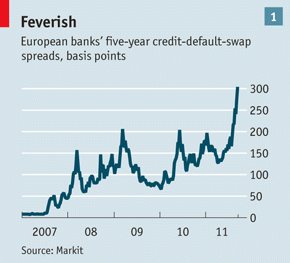[Meanwhile large banks in Germany Switzerland Britain
The euro-zone crisis
 Meanwhile large banks in
Meanwhile large banks in Germany Switzerland Britain
The troika monitoring the Greek plan
(the European Commission, the ECB and the IMF) also wants to see a realistic
budget draft for 2012. That means making drastic spending cuts as revenues are
being squeezed by the deepening recession. The Greek economy is likely to
contract by at least 5.3% this year. The government has already decided to
increase the number of public-sector workers parked on 60% of their salaries
pending dismissal or retirement. About 40,000 workers are now likely to be made
redundant by year-end. Greece Greece Europe ’s bail-out fund.
The euro-zone crisis
WHAT’S the French for “this sucker could go down”?
Echoes of 2008, when the global financial system wobbled and George Bush gave
his pithy view of the American economy, now resound on the other side of the Atlantic . Credit-default-swap spreads for European banks, a measure of how
costly it is to buy insurance against their default, are at record highs (see
chart 1).
The rates that banks charge each other
for loans in the interbank market are rising, too, as they did then. Rumours swirl
and panic flares: shares in BNP Paribas, a well-run French bank, dropped by 12%
on the morning of September 13th following reports that no one would lend it
dollars. BNP’s denials saw the shares bounce back later in the day. Shares in
Société Générale, another French bank, whipsawed too. The French banks’
reliance on short-term dollar funding, which American money-market funds are
increasingly leery of providing, is one reason why Moody’s, a ratings agency,
downgraded Société Générale on September 14th, though exposure to sovereign
default is also a key factor.
 Meanwhile large banks in
Meanwhile large banks in
Thus the role of the Frankfurt-based
European Central Bank (ECB) grows larger. The northern banks deposit their
excess cash there rather than lend in the interbank market. The banks on the
periphery increasingly depend on the ECB for liquidity. More than a fifth of
Greek bank funding is now provided through Frankfurt ; Italian lenders have upped their ECB
borrowing sharply over the summer.
Banks are finding it hard to issue
longer-term debt, too. The market for unsecured bonds has been closed for
weeks, leaving banks with no option but to sell covered bonds at usurious
interest rates that will challenge their profitability.
One way of bolstering the banking system
would be to inject more capital into it. Goldman Sachs, an investment bank,
reckons that Europe ’s 38 biggest banks might need between
€30 billion and €92 billion ($41 billion-$126 billion) in extra capital to cope
with haircuts to Greek, Irish and Portuguese government bonds and losses on
Italian and Spanish government debt. An analysis by the IMF suggests that banks
would see a hit of close to €200 billion if the default probabilities implicit
in today’s market prices were realised, although European governments and banks
dispute the fund’s calculations.
Raising capital in current markets will
not be easy. Bank valuations are low; several banks might need to raise several
times more than their current market value. Those shareholders that do not
participate will have their holdings deeply diluted. That suggests governments
might have to underwrite some of the rights issues.
Here the parallels with the credit
crisis three years ago become ominously inexact. In 2008 governments did what
was needed to protect their banks: guarantees were issued, equity injected. In
the euro-zone crisis the threat of sovereign default renders some governments
impotent, while those which could act have chosen not to do so decisively.
The government at the heart of concerns
again this week is that of Greece
The scrambling might be enough to allow Greece
Stark choices
Mrs Merkel is having none of it. On
September 14th, after a conference call with George Papandreou, the Greek prime
minister, she and Nicolas Sarzoky, the French president, reaffirmed
The problem is that although a beefed-up
EFSF will be able to cope with the smaller peripherals, it is unable to support
the refinancing needs of an economy as big as Italy
The pressure on European banks will keep increasing unless something else is done. Rumours thatChina
The pressure on European banks will keep increasing unless something else is done. Rumours that
On September 9th Jürgen Stark, the
central bank’s chief economist and a former Bundesbanker, announced his
resignation “for personal reasons”. Mr Stark opposed the ECB’s buying of Greek
government bonds last year. When the bank began supporting Italian and Spanish
government bonds, too, it was apparently more than he could take. Axel Weber,
the head of the Bundesbank until May 1st, ruled himself out of the running to
replace Jean-Claude Trichet, the ECB president, earlier this year because of
similar qualms.
The German government moved swiftly to
fill the hole left by Mr Stark. Jörg Asmussen, chief secretary at the finance
ministry, will move to the ECB, assuming the formalities go without a hitch.
Both Mr Asmussen and Jens Weidmann, Mr Weber’s successor at the Bundesbank,
appear more flexible personalities than their predecessors. But persuading
them, and the German public, to sign up to what amounts to a policy of massive
quantitative easing (creating money to buy bonds) will be extremely difficult.
In 2008 free-market Americans swallowed their misgivings to rescue Wall Street.
Inflation-phobic Germans now face a similar choice.


